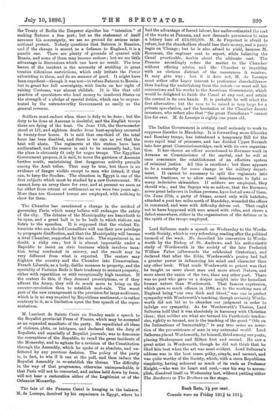Lord Selborne made a speech on Wednesday to the Words-
worth Society, which is very refreshing reading after the political turmoil of the week. He described his conversion to Words- worth by the Bishop of St. Andrews, and his enthusiastic study of Wordsworth in the society of the late Frederick William Faber (afterwards the celebrated Oratorian), and declared that after the Bible, Wordsworth's poetry had had a greater power in influencing his mind and character than any other book. What made Wordsworth so potent was that he taught us more about man and more about Nature, and more about the union of the two, than any other poet. There was no poet who gave us a deeper insight into the homeliest human nature than Wordsworth. That famous expression, which gave so much offence in 1866, as to the working men of England being "our own flesh and blood," was one in perfect sympathy with Wordsworth's teaching, though certainly Words- worth did not bid us to abandon our judgment in order to indulge our sympathy. As for Wordsworth's Theism, Lord Selborne held that it was absolutely in harmony with Christian ideas ; that neither are what are termed his Pantheistic tenden- cies, rightly so termed, nor is the teaching of the great "Ode on the Intimations of Immortality," in any true sense an asser- tion of the pre-existence of man in any antenatal world. Lord Selborne placed Wordsworth, for himself, third among our poets, placing Shakespeare and Milton first and second. He saw a great artist in Wordsworth, though he did not think that he liked him best when the art was most evident. Lord Selborne's address was in the best sense pithy, simple, and earnest, and was quite worthy of the Society, which, with a stern Republican simplicity, having achieved as much of its ends as Professor Knight,—who was its heart and soul,—saw his way to accom- plish, dissolved itself on Wednesday last, without putting either The Borderers or The Brothers on the stage.
















































 Previous page
Previous page